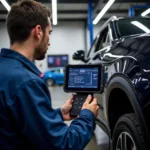Choosing the right car diagnostic tool can be a daunting task, especially with the distinct differences between diesel and petrol engines. This guide will delve into the specifics of “diesel vs petrol car tool” selection, helping you make an informed decision based on your needs.
Understanding the Differences: Diesel vs. Petrol Engines
While both diesel and petrol engines serve the same purpose – powering your vehicle – their underlying mechanics differ significantly. These differences translate into specific diagnostic requirements, impacting the type of tool you need. Petrol engines rely on spark plugs for ignition, while diesel engines use compression ignition. This core distinction necessitates different diagnostic approaches, affecting parameters like fuel pressure, injection timing, and emissions. Consequently, a tool designed for a petrol engine might not be equipped to diagnose issues specific to a diesel engine, and vice versa.
Understanding these fundamental differences is crucial for selecting the appropriate diagnostic tool. Choosing the wrong tool can lead to inaccurate readings, misdiagnosis, and wasted time and money.
Key Features to Consider When Choosing a Car Diagnostic Tool
Whether you’re working on a diesel or petrol engine, certain features are essential for effective diagnostics. Look for tools offering comprehensive code reading and clearing capabilities, including manufacturer-specific codes. Live data streaming is crucial for monitoring real-time engine performance, allowing you to identify intermittent issues. Bi-directional control functionality enables you to activate components like actuators and solenoids, aiding in pinpoint diagnosis.
For diesel engines specifically, consider tools with advanced functionalities like DPF regeneration and injector coding. These features cater to the unique needs of diesel systems, ensuring thorough and accurate diagnosis.
Specific Considerations for Diesel Car Tools
Diesel engines, known for their robustness and fuel efficiency, present unique diagnostic challenges. Diesel car tools often require specialized functionalities to address these challenges. DPF (Diesel Particulate Filter) regeneration is a key feature, allowing you to initiate the cleaning process and diagnose DPF related issues. Injector coding is essential for matching injectors to the engine control unit (ECU) after replacement, ensuring optimal performance and fuel efficiency. Look for tools that support these functionalities when working with diesel engines.
Specific Considerations for Petrol Car Tools
While generally less complex than diesel engines, petrol engines still require specific diagnostic capabilities. Features like misfire detection and ignition system analysis are crucial for identifying common petrol engine problems. Advanced tools might offer functionalities like fuel trim analysis, providing insights into fuel delivery and efficiency. Ensure the tool you choose can handle the specific requirements of petrol engine diagnostics.
Navigating the Market: Tool Types and Brands
The market offers a wide range of car diagnostic tools, from basic code readers to professional-grade scan tools. Basic code readers are suitable for DIY enthusiasts, providing basic code reading and clearing capabilities. Professional scan tools offer advanced functionalities like live data, bi-directional control, and specialized functions for diesel or petrol engines. Reputable brands often offer better support, updates, and reliability.
Do I Need Separate Tools for Diesel and Petrol Cars?
While some high-end diagnostic tools cater to both diesel and petrol engines, having separate dedicated tools can offer advantages in terms of specialized functionality and ease of use. However, budget constraints and frequency of use might dictate a different approach. Consider your specific needs and budget when making a decision.
“Investing in the right diagnostic tool is crucial for any mechanic, whether professional or DIY enthusiast. The specific requirements for diesel and petrol engines demand careful consideration,” says John Smith, Senior Automotive Engineer at DiagFixPro.
Conclusion
Choosing the right car diagnostic tool depends on the type of engine you’re working with – diesel or petrol – and your specific diagnostic needs. Consider the key features discussed in this guide, research different brands and models, and choose a tool that aligns with your budget and expertise. Investing in the right “diesel vs petrol car tool” will empower you to diagnose and fix car problems effectively, saving you time and money in the long run. Remember that having the right tool is essential for ensuring the optimal performance and longevity of your vehicles.
FAQs
- What is the main difference between a diesel and petrol engine? Diesel engines use compression ignition, while petrol engines use spark plugs.
- What is DPF regeneration? It’s a process that cleans the Diesel Particulate Filter.
- Why is injector coding important for diesel engines? It ensures optimal performance and fuel efficiency after injector replacement.
- What are the benefits of live data streaming? It allows you to monitor real-time engine performance.
- Do I need a professional scan tool for DIY diagnostics? It depends on your technical skills and the complexity of the diagnostics.
- Can one tool diagnose both diesel and petrol engines? Some high-end tools can, but dedicated tools offer specialized functionality.
- Where can I find more information on car diagnostic tools? Check out DiagFixPro for comprehensive reviews and guides.
Looking for other car-related tools? Perhaps our car recommendation tool india might be of interest.
For more information about maintaining your vehicle, explore our other helpful articles on DiagFixPro. We offer a wealth of resources to help you keep your car running smoothly.
Need assistance? Contact us via WhatsApp: +1(641)206-8880, Email: [email protected] or visit us at 910 Cedar Lane, Chicago, IL 60605, USA. Our customer support team is available 24/7.
